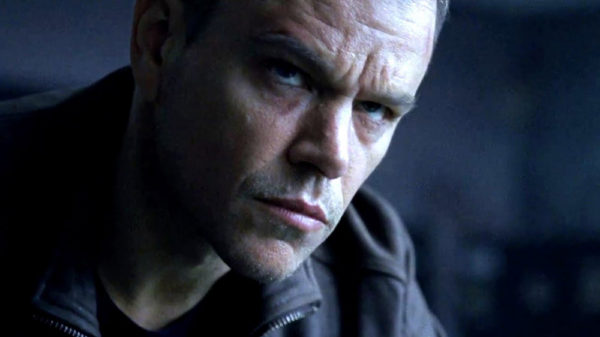When The Bourne Identity burst onto screens in 2002, it was a breath of fresh air, a revolutionary spy thriller that turned the whole genre on its head with its grounding in contemporary geopolitics and kinetic style.
Even the James Bond franchise, then entering its fortieth year, was not immune to its influence, with Daniel Craig’s early entries clearly owing a huge debt to the original Bourne trilogy.
Sadly, for all the talk of updating Bourne for the modern world, Jason Bourne, the fifth film in the franchise and the fourth starring Matt Damon, is a disappointingly archaic entry.
Everything Jason Bourne has to offer is a retread of what we have seen before. The quirks and innovations that the franchise were famed for now feel rote. By the time Bourne has used an innocuous object as weapon, following the obligatory climactic car chase, the deja-vu has long since settled in. When the credits roll (we’ve not heard Moby in a while!), the sad realisation dawns that the preceding two hours have little more than a very long checklist of franchise staples.
The film’s main attempt to address contemporary issues seems to be to namedrop Edward Snowden as often as possible. The vague references to the looming threat of universal global surveillance, explored so well in Captain America: The Winter Soldier, never really extend to addressing how exactly this might be achieved. Whereas Bond took its inspiration from Bourne in the mid-2000’s, here ironically we have Jason Bourne rehashing a lazy plot device seen in last year’s Spectre.
Just as in that film, Jason Bourne also suffers from a clunky inserting of retroactive continuity. Bourne is coaxed into action by secrets surrounding his father’s agency past; a father never previously mentioned in the series. It’s a revelation that, like Spectre’s unnecessary familial Blofeld twist, just makes the franchise’s world seem smaller. Bourne’s quest to find himself, to remember his past, was a riveting one; a plight one could sympathies with and root for.
Here, however, the film never really establishes a true sense of what Bourne actually wants. Characters talk about and around him, speculating on his motives, but we never have any real time with Bourne himself.
Indeed Bourne’s stoic silence actually borders on parody here, rendering him something of a caricature, and his journey dramatically inert.
Is he a man after revenge – a disappointingly clichéd motivation for a hitherto daring series – or is he, as some characters speculate, actually looking to come in from the cold, rejoining the agency that has burned him so much? It seems preposterous, but the film is so unsure of itself that it all seems worryingly possible.
The talented cast meanwhile are surprisingly underwhelming. Tommy Lee Jones as Robert Dewey is the latest to step off the conveyor belt of old, white, male CIA chiefs. He brings his usual gravelly schtick but compared to his predecessors (Cooper, Cox, Straithairn) his antagonist is instantly forgettable.
Alicia Vikander, so good in Ex_Machina and The Man from UNCLE, is wooden here, as is a returning Julia Stiles, while Vincent Cassel provides the requisite physical opponent, but again seems to be going through the motions. Perhaps the problem is that all of these undeniably fine actors are reduced here to playing Bourne archetypes as opposed to anything approaching an actual person.
Even geographically there is a resounding sense of ‘been there done that.’ The film has staged superlative sequences in Berlin and London in Supremacy and Ultimatum respectively, but repeat visits to both here are drab, repetitive affairs.
Las Vegas meanwhile is host to a spectacular albeit preposterously over the top chase down the strip, but well shot as the carnage is, it just seems like an inappropriate setting for this series; a city with no real politics or intrigue in regards to espionage or the world order.
The opposite is thankfully true of an astounding early sequence in Athens. Set in the midst of anti-austerity riots, the scenes are as good as anything the series has previously offered. Returning director Paul Greengrass masterfully choreographs and films the action in all its chaos and confusion, his signature shakey-cam style used to its fullest potential here. Throwing Bourne into the middle of this painfully prescient and politically charged event does more to ground the series in 2016 than any of the film’s heavy handed attempts to depict social media or cyber warfare.
‘The problem with Dewey is that he belongs in the past,’ one character muses at one point. Sadly, Jason Bourne would seem to be case and point why the same is true of this once groundbreaking series.
Greengrass is a talented filmmaker and Damon is clearly invested in the direction of the franchise beyond just his paycheck, so there is no reason to believe that there is not a great film about Bourne in a post-Snowden world. Jason Bourne is sadly not it.
That early Athens-set sequence engenders a hope that the fifth entry will prove as radical and sharp as ever. Sadly, the film never scales these heights again, instead descending into an increasingly generic series of fights, chases and evasions; groundbreaking in the year we got Die Another Day and xXx, but rather tired 14 years later. The world has indeed moved on, but sadly, the franchise has not.
Released on DVD and Blu-ray on Monday 28 November 2016 by Universal Pictures (UK).
Buy Jason Bourne on Amazon here.
What did you think of the movie? Let us know below…

